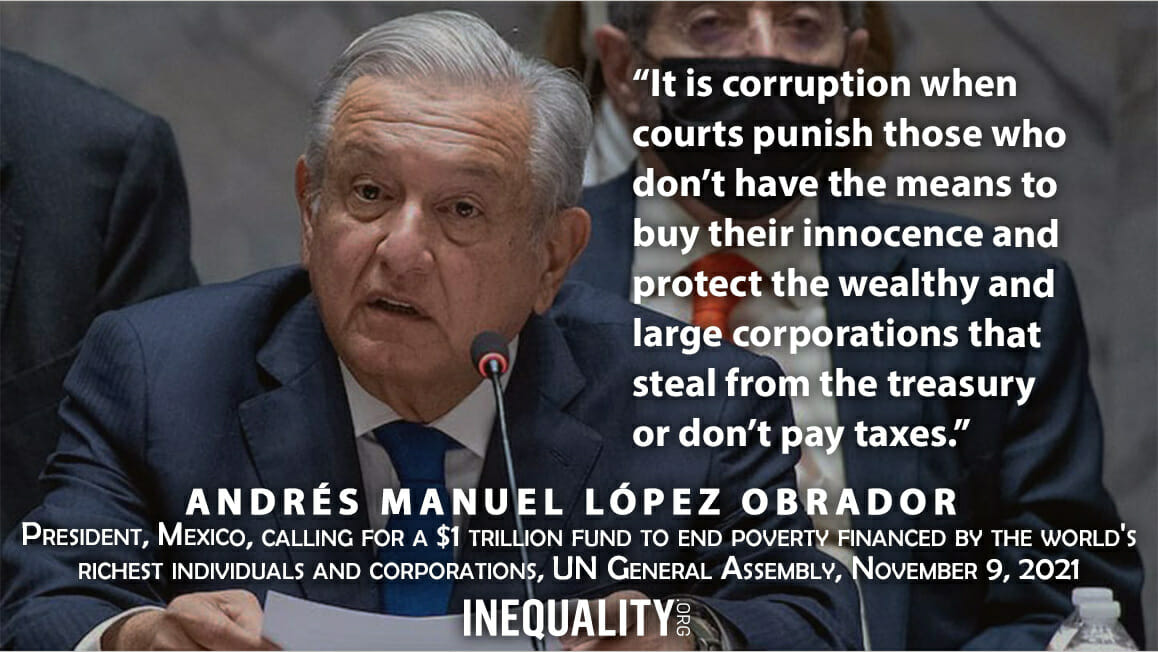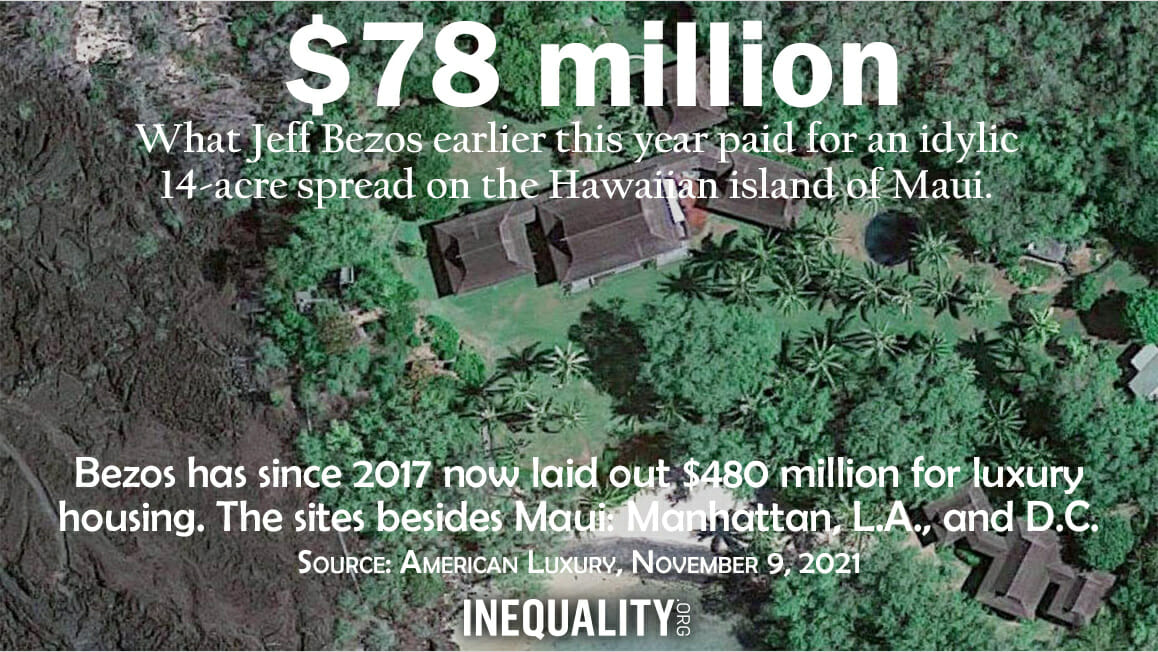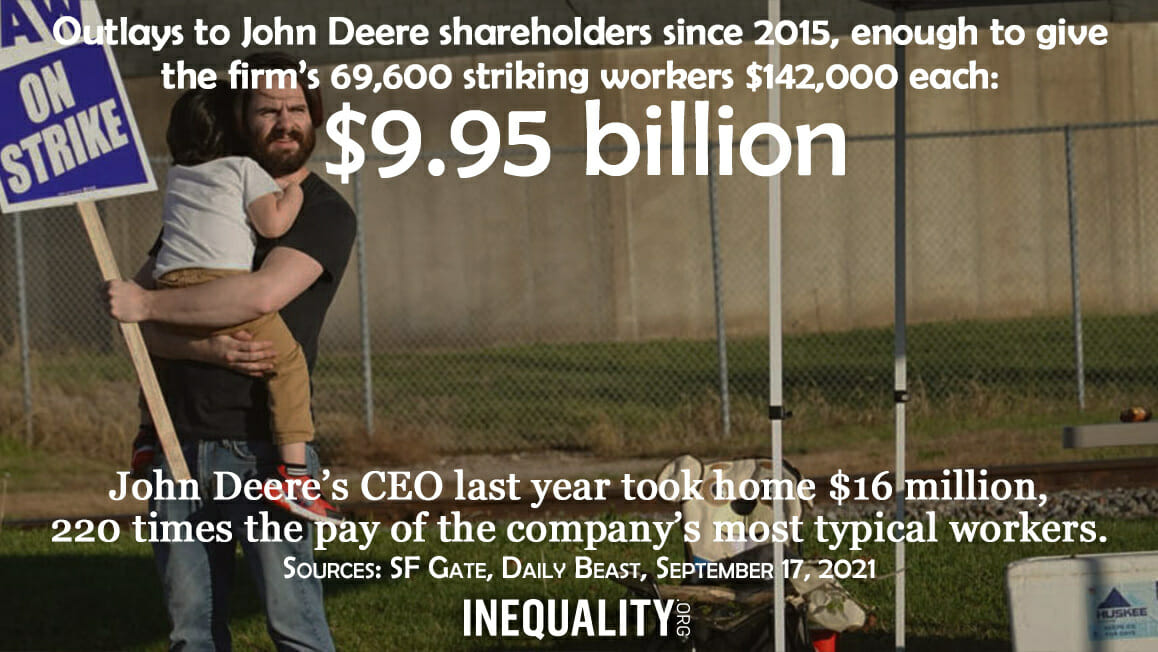| THIS WEEK |
The United Nations Climate Change Conference — COP26 in the headlines — has come to an end. At the conference’s conclusion, leaders agreed to the first-ever climate deal to explicitly plan to reduce coal.
But reducing greenhouse gas emissions makes up just one part of the agenda for building a truly sustainable planet. We need to end fossil fuel greed as well. And that’s going to require, as we’ve noted before, directly challenging our global concentration of income and wealth, a core driver of climate change. The top 1 percent are now generating 15 percent of global emissions, nearly twice as much as the world’s poorest 50 percent.
In today’s issue, we have more on inequality and our environment, including a new report from the climate team here at the Institute for Policy Studies that lays out how one state, Nebraska, could transition away from the dirty fossil fuel industry and into the future of renewables.
Meanwhile, the fight continues over President Joe Biden’s Build Back Better, legislation that contains key provisions that will help reduce both inequality and environmental devastation. The battling over Build Back Better now appears likely to go on into December. As always, Inequality.org will be there to bring you analysis on all the latest twists.
Chuck Collins and Rebekah Entralgo,
for the Institute for Policy Studies Inequality.org team
|
|
| |
|
| INEQUALITY BY THE NUMBERS |
 |
|
|
|
| |
|
| FACES ON THE FRONTLINES |
 |
| Cabbies Took on Predatory Lenders — and Won |
| In the early 2000s, Richard Chow and his brother Kenny took out loans of over $400,000 each to purchase taxi medallions — the physical permits needed to own and operate taxis in New York. Like many immigrants, the Chow brothers saw driving taxis as a ladder to the middle class. But in 2015, as unregulated companies like Lyft and Uber entered the market, the value of medallions plummeted, leaving drivers in crippling debt. The financial stress became so overwhelming that Kenny took his own life. In October, Richard and other taxi drivers went on a hunger strike to force New York City to agree to a debt restructuring deal. After 15 weeks of drinking only water and Gatorade, Richard and his fellow cabbies finally won their struggle. Rebekah Entralgo has more on how this worker-driven victory could pave the way for future debt relief. |
|
| |
|
| WORDS OF WISDOM |
 |
|
|
|
| |
|
PETULANT PLUTOCRAT
OF THE WEEK |
 |
| Did This CEO Leave His Extortion Workshop Early? |
| America’s corporate CEOs have many nasty habits. These CEOs, for instance, regularly lie when they go after state subsidies. They intimate they’ll have to pull up stakes unless they get the “incentives” they need to stay — when they actually have no intention of leaving. Josh James, the CEO of software start-up Domo, earlier this year expertly played this veiled-threat game with Utah’s Office of Economic Opportunity. His prize: tax incentives worth $23 million. But then James slipped up. He openly admitted at a breakfast with state lawmakers that he never had any plans to leave Utah. Embarrassed state officials have now begun an investigation, and Utah media have jumped on the story. James has kept mum since the scandal broke, but he did have his flacks insist that Domo’s filings with the state have been “true and correct in all material respects.” This CEO’s personal materiality, in the meantime, has been doing just fine. His take-home last year totaled $12.4 million. |
|
| |
|
| BOLD SOLUTIONS |
 |
| Just Transition for Jobs and a Sustainable Nebraska |
| Nebraska ranks fourth in the country for wind energy potential, yet as of 2020 produced just 24 percent of its net electricity through wind. The state can and should do so much more to stand up to powerful fossil fuel interests and support renewable energy. Wind energy could lead to a healthier future, both environmentally and economically. In 2019, the coal industry lost nearly 8,000 jobs nationwide, while the renewable energy sector added 10,900 jobs. And land lease payments for wind energy development — $706 million nationwide in 2019 — also provide a source of income for rural communities. Basav Sen, climate justice project director at the Institute for Policy Studies, and the IPS Next Leader program’s Alia Ganic share more in their latest report, Rain, Sun, and Wind: How an Energy Transition Could Power Nebraska. |
|
| |
|
| GREED AT A GLANCE |
 |
|
|
|
| |
|
| TOO MUCH |
 |
| The Moderna Billionaire New Gig: Erasing History |
| Moderna, the world’s hottest new Big Pharma giant, now has four of its top players sitting on the annual Forbes list of America's 400 richest. In early 2020, Moderna had exactly none. Moderna currently has a patent pending on the key vaccine breakthrough that minted the company’s billionaire quartet. But the Moderna patent application makes no mention of — and gives no credit to — the scientists from the U.S. National Institutes of Health who devoted four years to helping Moderna generate that breakthrough. Why has Moderna airbrushed out the federal role? Simple. Moderna’s billionaires want more billions. Inequality.org co-editor Sam Pizzigati has more. |
|
|
|
| |
|
| MUST READS |
This week on Inequality.org
Esteban Salazar and Daniela Garzón, Colombia and the Pandora Papers. The Panama and Pandora Papers exposed how influential public figures in Colombia have wielded their political influence to avoid paying taxes.
Bob Lord and Sam Pizzigati, Should Rich People Get a Free Pass at Tax Time? We’re finally debating that question. Let’s not miss our opportunity.
Elsewhere on the Web
Jake Bernstein, Loopholes for Kleptocrats, New York Review of Books. The term “tax haven” may conjure images of Caribbean isles and palm trees, but two recent books — one of them by Inequality.org’s Chuck Collins — make the case that the world’s leading tax haven just happens to be the United States.
George Monbiot, Make extreme wealth extinct: it’s the only way to avoid climate breakdown, Guardian. The very rich arrogate to themselves the lion’s share of the planetary space on which we all depend. Why do we tolerate this attack on our common interests?
Amy Goodman and Nermeen Shaikh, How Wealth Inequality Fuels the Climate Emergency, Resilience. In the wake of COP26, an analysis of why we so need to stop the super wealthy’s seizure of our natural wealth.
Carl Davis, Paying the Estate Tax Shouldn’t Be Optional for the Super Rich, Just Taxes. Unlike other tax provisions that died a very public death at the hands of senators Joe Manchin and Kyrsten Sinema, estate tax reform appears to have been stripped out in backroom dealing that yielded a huge payoff for the nation’s billionaires. But the Senate still has an opportunity to add these reforms back into the package.
Helaine Olen, Elon Musk once again proves the need for a billionaire tax, Washington Post. Billionaires are portraying themselves as misunderstood victims, and too many of our elected officials continue to give them a free pass at tax time.
Michael Hiltzik, Thank you, Elon Musk. You’ve just proved why a billionaires tax is essential, Los Angeles Times. Do we really want solutions to pressing social problems left to the whims of a tiny handful of ultrawealthy individuals?
Robert Reich, Wealth Inequality Explained, YouTube. The perfect brief video to share with friends and family wondering why all the fuss about concentrated wealth. The text version.
John Harris, If the super-rich want to live forever, our planet is truly doomed, Guardian. Imagine if the most trailblazing, publicity-attracting projects of 21st-century billionaires involved not leaving the planet or living indefinitely, but the kind of earthbound things that could transform lives in the here and now. |
|
| |
|
| A FINAL FIGURE |
 |
|
|
|
| |
|
| BE THE 1% (NO, NOT THAT 1%) |
 |
Our goal for 2021: that 1% of our Inequality.org subscribers become monthly sustainers and help grow our newsletter and research efforts. Be the 1%, for as little as $3 a month! |
|
|
|
| |
|
|